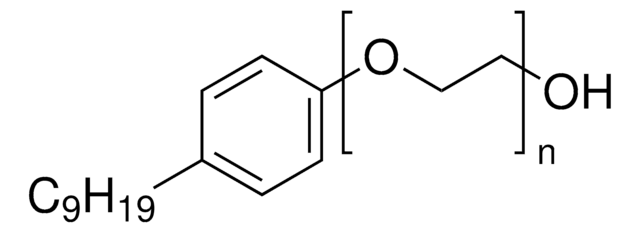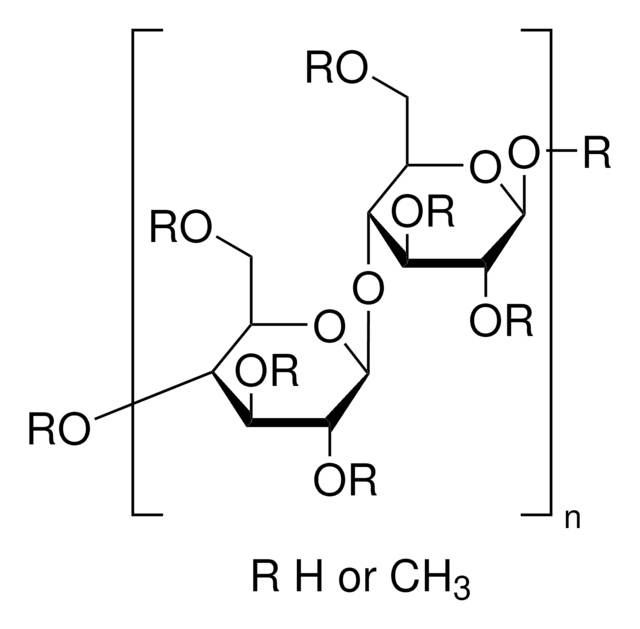542334
IGEPAL® CO-630
average Mn 617
Synonym(s):
Polyoxyethylene (9) nonylphenylether, branched
Sign Into View Organizational & Contract Pricing
All Photos(1)
About This Item
Linear Formula:
(C2H4O)n · C15H24O · n=9-10
CAS Number:
MDL number:
UNSPSC Code:
12162002
NACRES:
NA.23
Recommended Products
General description
IGEPAL® CO-630 is an alkylphenol ethoxylate that is majorly used as an anionic surfactant. It belongs to the IGEPAL series of surfactants, which have hydrophobic chains. Its properties include low surface tension, low sensitivity, and biocompatibility
Application
Nonionic surfactant.
Legal Information
IGEPAL is a registered trademark of Solvay
Signal Word
Warning
Hazard Statements
Precautionary Statements
Hazard Classifications
Aquatic Acute 1 - Aquatic Chronic 1
Storage Class Code
10 - Combustible liquids
WGK
WGK 3
Flash Point(F)
Not applicable
Flash Point(C)
Not applicable
Choose from one of the most recent versions:
Already Own This Product?
Find documentation for the products that you have recently purchased in the Document Library.
Wetting of TX-100 and Igepal CO-630 Surfactants on a PTFE Surface
Biswal NR and Paria S
Industrial & Engineering Chemistry Research, 50(10), 6138-6145 (2011)
Preparation of highly concentrated stable dispersions of uniform silver nanoparticles
Sondi I, et al.
Journal of Colloid and Interface Science, 260(1), 75-81 (2003)
Viktorija Herceg et al.
Molecules (Basel, Switzerland), 25(18) (2020-09-24)
Cyclopeptidic chemotherapeutic prodrugs (cPCPs) are macromolecular protease-sensitive doxorubicin (DOX) prodrugs synthesized from a cyclodecapeptidic scaffold, termed Regioselectively Addressable Functionalized Template (RAFT). In order to increase the chemotherapeutic potential of DOX and limit its toxicity, we used a Cathepsin B (Cat
Mirko Trilling et al.
Journal of virology, 83(8), 3684-3695 (2009-02-13)
Vaccinia virus (VACV) replicates in mouse and human fibroblasts with comparable kinetics and efficiency, yielding similar titers of infectious progeny. Here we demonstrate that gamma interferon (IFN-gamma) but not IFN-alpha or IFN-beta pretreatment of mouse fibroblasts prior to VACV infection
Inhibition of transcription by dactinomycin reveals a new characteristic of immunogenic cell stress.
Juliette Humeau et al.
EMBO molecular medicine, 12(5), e11622-e11622 (2020-04-24)
Chemotherapy still constitutes the standard of care for the treatment of most neoplastic diseases. Certain chemotherapeutics from the oncological armamentarium are able to trigger pre-mortem stress signals that lead to immunogenic cell death (ICD), thus inducing an antitumor immune response
Our team of scientists has experience in all areas of research including Life Science, Material Science, Chemical Synthesis, Chromatography, Analytical and many others.
Contact Technical Service





